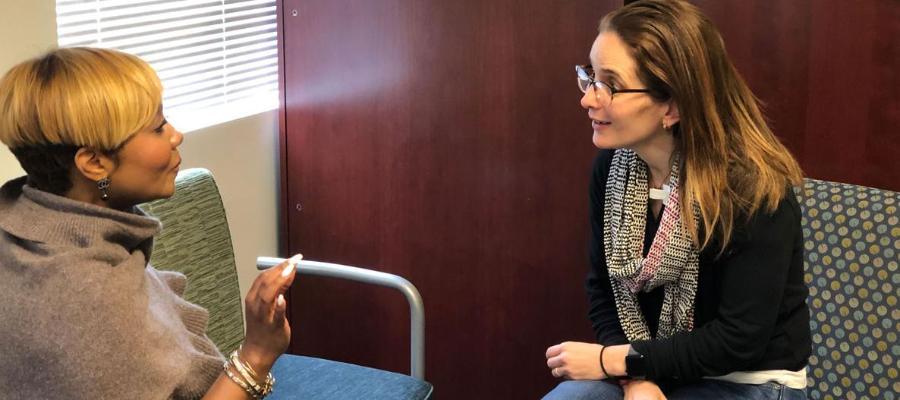
The Engagement Coach Training program is a coaching skills development program aligned to International Coach Federation (ICF) standards. The program has five courses plus a performance evaluation, designed to train participants in the ICF core competencies. This leads to enhanced communication skills, more effective relationships and greater work/life fulfillment skills that can be invaluable in any environment.
For participants interested in becoming a certified coach, this program fulfills the 125-hour coach-specific training requirement for the Associate Certified Coach (ACC and PCC) Level 2 Pathways.
Students are required to complete 125 hours for this coach training program. The learning goals and brief overviews for each Engagement Coach course and the performance evaluation are below.
In this foundational course, participants are introduced to the Engagement Coaching Model, essential coaching skills, International Coach Federation’s (ICF) core competencies and ethical guidelines, and a variety of tools and activities that provide access points for coaching and personal and professional development.
Upon completion of this course, the participant will be able to:
In this second course, Expand, participants are introduced to new strategies to assist clients in expanding their perspectives and designing actions to move the client forward. Expand deepens and builds on the foundational learning from the first course, Engage.
Upon completion of this course, the participant will be able to:
In this third course, Experience, participants are introduced to new techniques to help clients be present to a broader range of emotions to experience all aspects of life in a more impactful, fulfilling way. Experience deepens and builds on the foundational learning from the first and second courses in order to integrate all of the components of the Engagement Coaching Model and create coaches with a broadened range.
Upon completion of this course, the participant will be able to:
In this fourth course, participants demonstrate and strengthen essential coaching skills through the integration and application of all components of the Engagement Coaching Model for clients and small groups. Participants implement structures that support the coach to sustain powerful action to realize goals and continue evolving as a coach. Participants deepen, enhance and incorporate coaching skills learned in the previous Engagement Coaching courses, Engage, Expand and Experience.
Upon completion of this course, the participant will be able to:
In this fifth and final coaching course, participants apply new tools and activities in the coaching process. Participants demonstrate an elevated level of professional coaching standards and impact integrating a complete range of coaching skills learned in the previous Engagement Coaching courses.
Upon completion of this course, the participant will be able to:
This performance evaluation is for participants who have successfully completed the five coaching courses in this program and want to pursue the ICF Associate Certified Coach (ACC) ACTP pathway. Participants will integrate a complete range of Engagement Coaching skills in this performance evaluation and demonstrate an elevated level of professional coaching standards aligned with the International Coach Federation (ICF) core competencies.
Upon completion of the Performance Evaluation, the participant will be able to:
Coaching is about supporting people as they move from Point A to Point B and beyond. For participants interested in becoming a certified coach, this program fulfills the 125-hour coach-specific training requirement for the Associate Certified Coach (ACC) Level 2 pathway through ICF. Participants can also complete four coaching course to earn the credit or non-credit Life and Engagement Coach Certificate through AACC.


AACC’s Engagement Coaching program, which is the only such community college program in the nation accredited by the International Coach Federation, teaches people how to ask questions of others to help them find their own solutions to life’s obstacles.
Read Jesse's Story HereThe Engagement Coach Training Program aligns with ICF standards and trains new coaches in a diverse coaching skill set gleaned from the five courses: Engage, Expand, Experience, Integration and Impact. After completing the five courses, coaches will have an arsenal of skills and tools to use with clients in a range of environments at work, home and beyond.
Do you have questions about our certificate program? We have answers! Below you will find additional information about the Engagement Coach Training program.
The dates and times for the Engagement Coach Training program will be set by AACC and can be found in the course search. Check back each term for new program start dates. The estimated hours of each instructional day (in person) is 8 a.m. to 4 p.m. with a short break for lunch. For online, synchronous instruction, the course generally meets for three to five hours at a time by video conference. The estimated time to complete the entire program – five courses – is nine months. The program will take place at an Anne Arundel Community College location, another announced location or online. If you are from a school district, organization or business and would like to have this program offered exclusively to your employees or members, inquire by emailing Antione Tomlin.
Currently we only offer this program in English.
The 125 hours of synchronous training for this program is offered in both face-to-face and synchronous online formats. The first three coaching courses must be taken in the required order: Engage (EDU-201), Expand (EDU-202) and Experience (EDU-203). The last two coaching courses, Integration (EDU-204) and Impact (EDU-205), can be taken in any order after the first three courses are completed. The Performance Evaluation (TAD-337) is for participants who have successfully completed the five coaching courses in this program and want to pursue the ICF Associate Certified Coach (ACC) Level 2 Pathway (formally known as the ACTP pathway).
This program is designed for cohorts of up to 24 participants who will take all five courses consecutively and is accredited by the International Coach Federation. There is an expectation that participants will complete a specified amount of coaching with clients over the duration of the program on which they will receive written feedback. Due to the broad nature of coaching, this program is ideal for participants who are growth-minded, interested in expanding personally and professionally, and seek to positively impact others. Information will be shared regarding current requirements for participants who seek AAC certification through ICF.
Participants for this program must be 18 or older and have English proficiency. There are no other prerequisites to enrolling, however, the first three courses must be taken in order.
The information below reflects costs as of fall 2024. The costs do not include student fees. Visit the Credit Tuition and Fees page for information.
Yes, however, additional costs may apply. Students should budget an extra $125-$350.
Due to the nature of this comprehensive training program and the accreditation standards, mandatory attendance is required of all participants at all training sessions (whether in person or online). Learn more about refunds and withdrawals.
The Engagement Coach Training Program at AACC is ICF-accredited as a Level 2 program. That means the program teaches the same exact core competencies as any other Level 2 program in the region (or world since ICF is global). Since the program's philosophy is experiential, the curriculum is likely taught more hands-on and practically than in other coach training programs. With the program being at a community college, the cost is affordable and accessible to a broader group of students.
Generally, a new series of coaching classes begins each fall and spring term. Fall coaching classes usually are in person at the Arnold campus over one weekend: Friday, Saturday and Sunday from 8 a.m. to 4 p.m., with homework and assignments to follow. In the spring, coaching classes are traditionally offered via Zoom over one weekend: Thursday, Friday, Saturday and Sunday from 10 a.m. to 3 p.m., with homework and assignments to follow.
Due to AACC’s ICF accreditation, attendance at all training sessions is mandatory. If students cannot make a date, we encourage them to take the coaching course another term, when the dates and times work better for their schedule.
Yes! You will apply and register as all students must do. Your tuition and fees are dependent on where you live.
Interested in being coached? The role of an Engagement Coach is to support a person — like you! — as you move from Point A to Point B and beyond here at the college. Engagement Coaching is not therapy or counseling. Engagement Coaching is not mentoring, advice-giving or problem-solving. Instead, your Engagement Coach is trained to ask you powerful questions that help you find solutions to your challenges and overcome obstacles to your success.
For inquiries about coaching outside of the areas below, contact Antione Tomlin.
Students in the Entrepreneurial Studies Institute, specifically those who receive the Entrepreneurs Scholarship funded by the Ratcliffe Foundation, have the opportunity to receive coaching. Once you are assigned to one of our trained coaches, you are to be coached a minimum of three sessions. Once these three coaching sessions have been met, you are encouraged to continue with that coach as long as both you and your coach agree. Topics to be coached on are decided completely by you! To sign up to be coached, contact Stephen Berry.
All Honors students have the opportunity to get coaching at AACC with one of our trained coaches! Coaching is available by appointment, either in person or phone call, and you can choose from a roster of coaches.
But don't think coaching has to be limited to just school issues! Bring ideas on anything that you'd like to discuss! Contact the Honors office or coordinator Alyson Turner for further details.
Students in the Law Enforcement and Criminal Justice programs and the Aspiring Leaders Academy have the opportunity to receive one-on-one and group coaching. To sign up to be coached, contact Dr. Reynaldo Evangelista or Dr. Darian Senn-Carter for more information.
The Engagement Coaching experience is open to all Student Achievement and Success Program (SASP) members. The purpose of this experience is to support you as you move through your experience at AACC, in addition to receiving academic support and success strategies from SASP. This opportunity will offer you up to three, 30-minute, sessions with an assigned coach during a single term. The topic of discussion during each session is determined completely by you and may include personal, professional, or academic situations. If you would like to participate, you should contact your SASP advisor directly or the SASP office.
The Teacher Education and Child Care Institute (TEACH) is happy to offer Engagement Coaching as one of their resources for students in the program. Coaching at AACC offers you the opportunity to identify core values, meet goals, self-reflect, broaden awareness, promote strengths and remove blockages to success. It is an effective tool to increase happiness, health, focus and whatever else that is important to you! You will be paired one-on-one with a trained coach or have the chance to be in a group coaching session where the topics of discussion are decided by you! Are you majoring in education and want to experience one-on-one coaching? Contact Antione Tomlin for details.
If you are curious about coaching and want to begin working with a coach, visit our website to see which coaches are taking new clients and reach out to a coach of your choice.
A coaching session is generally 30, 45 or 60 minutes in length and we recommend starting with at least three sessions. You will meet either one-on-one with your Engagement Coach or in small groups (if you are participating in group coaching). The location for your coaching session is predetermined by you and your coach. Generally, you will meet in a quiet space — like an empty classroom, a conference room or an office. All information shared with your coach is confidential unless information is shared that breaches college policies or laws or compromises your safety and/or well-being and/or the safety and/or well-being of others.
The Engagement Coaches at AACC are all trained in a model of coaching that fulfills the core competencies of the International Coach Federation (ICF). Read more about ICF’s core competencies.
AACC offers open enrollment credit courses through our Engagement Coach Training program. We also offer noncredit offerings of those courses.
We are also able to bring a coaching program to your business and organization. Contact AACC’s Corporate Training Center for more information.
For participants interested in becoming a certified coach, this certificate fulfills the coach-specific training requirement for the Associate Certified Coach ACSTH (Approved Coach Specific Training Hours ) pathway through the International Coach Federation.